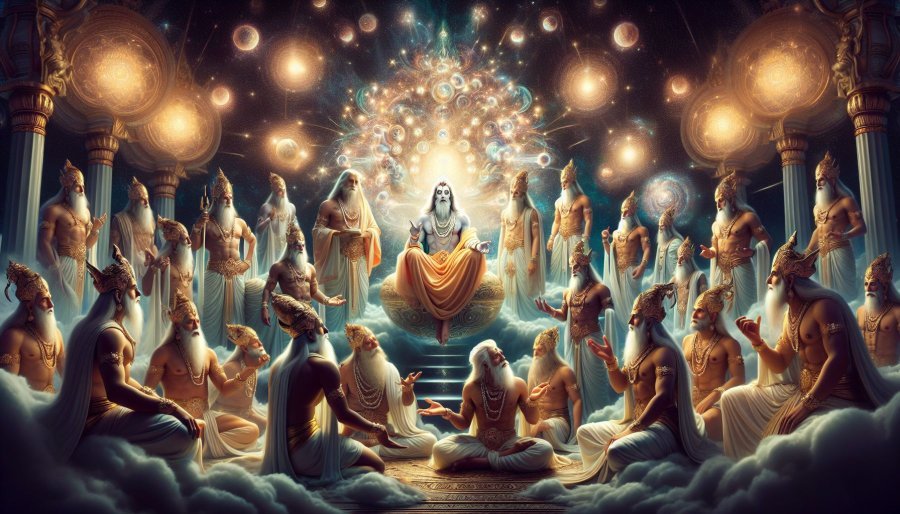Section CCXIII - The Story of Tilottama: A Damsel Created to Tempt the Asura Brothers
Book index: Mahabharata (English)
This page contains a summary of the Mahabharata Section CCXIII including examples of moral lessons in daily life. The Maha-Bharata is one of the largest epics ever written containing roughly 100,000 Sanskrit verses. It deals with the legendary history of ancient India and contains a large number of interwoven tales.

Short summary of the chapter:
The celestial Rishis approach Brahma with sorrowful hearts, informing him of the misdeeds of Asura brothers Sunda and Upasunda. Brahma commands Visvakarman to create a celestial maiden named Tilottama, who is unrivaled in beauty and capable of captivating all hearts. Tilottama is tasked with tempting the Asura brothers with her beauty in order to incite a quarrel between them. As Tilottama walks around the celestial conclave, Mahadeva (Shiva) gains multiple eyes to be able to see her from all directions.
Tilottama's beauty captures the attention of all the celestials, except for Indra and Mahadeva, who manage to maintain their composure. Mahadeva gains additional faces and eyes in his eagerness to behold Tilottama, while the other celestial beings turn their faces in all directions to catch a glimpse of her. As Tilottama departs for the city of the Asuras, it is believed that the task is already accomplished due to the captivating nature of her beauty.
The Asura brothers Sunda and Upasunda become enamored by the beauty of Tilottama when she arrives, causing them to quarrel fiercely over her. The celestial plan to incite discord between them succeeds, leading to their mutual destruction in a battle over Tilottama's hand. The celestial Rishis and gods witness the downfall of the Asura brothers, who are ultimately defeated by their own passions and desires incited by Tilottama's beauty.
The creation of Tilottama serves as a lesson on the detrimental effects of desire and attachment, as well as the power of beauty to influence and manipulate individuals. The celestial beings recognize the importance of maintaining control over their senses and passions, as demonstrated by Indra and Mahadeva's ability to resist the temptation presented by Tilottama. Ultimately, the story highlights the consequences of allowing desire to cloud judgment and lead to destructive actions, as seen in the tragic fate of Sunda and Upasunda.
Full English translation:
This page is merely a summary which is automatically generated. If you are looking for authentic sources such as the Sanskrit text or the Full English translation of Mahabharata Section CCXIII - The Story of Tilottama: A Damsel Created to Tempt the Asura Brothers, have a look at the following articles:
Section CCXIII, online text
English translation by Kisari Mohan Ganguli.
Read this and other chapters online.
Mahabharata (English Summary)
by Kisari Mohan Ganguli | ISBN-10: 8121505933
Buy the latest edition:
FAQ of Mahabharata, Section CCXIII:
What was the task assigned to Tilottama by the Grandsire?
Tilottama was tasked with tempting the Asura brothers Sunda and Upasunda with her captivating beauty, causing them to quarrel with each other upon seeing her.
How was Tilottama created and what was her appearance like?
Visvakarman created Tilottama with all handsome features and she was almost a mass of gems. She had unparalleled beauty that captivated the eyes and hearts of every creature.
How did the celestial beings react to Tilottama's beauty?
While walking around the celestial conclave, Tilottama caused the Asura Sunda and Upasunda to quarrel with each other due to the wealth of her beauty. Other celestial beings were also captivated by her beauty.
Daily life: The Story of Tilottama: A Damsel Created to Tempt the Asura Brothers:
The story of Tilottama and the assembly of gods and sages presents several valuable lessons that can be applied to our daily lives. At its core, the story teaches us about the power of distraction and the importance of self-control. Even the gods and sages, who are seen as paragons of virtue and restraint, find themselves enchanted by Tilottama's beauty, demonstrating how easily distractions can captivate our attention and lead us astray from our goals or duties.
In daily life, distractions are ubiquitous, manifesting in the form of social media, entertainment, or even our own desires and impulses. The narrative encourages us to cultivate self-discipline and mindfulness, reminding us to stay focused on our objectives, regardless of the allurements that may surround us. Just as Indra and Mahadeva managed to maintain their composure to a certain extent amid temptation, we too can strive to control our reactions to distractions, thereby ensuring that we remain aligned with our long-term goals and values.
Furthermore, the story highlights the consequences of envy and competition, as implied by the gods' intention for Tilottama to incite discord among the Asuras. This serves as a reminder to approach others with compassion and cooperation rather than rivalry, understanding that succumbing to petty disputes can lead to our downfall. In essence, by practicing self-restraint, focusing on our personal growth, and fostering positive relationships, we can navigate the complexities of life more effectively.
